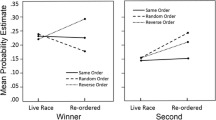Abstract
The aim of the research reported in this paper was to explore empirically whether levels of participation in horserace betting are affected by the complexity of the betting task. The study employed a systematic random sample of 1161 betting decisions made in UK offcourse betting offices during 1987. The research was conducted in a naturalistic setting where it was possible to grade complexity and to measure levels of participation. Complexity was defined in terms of both the number of alternatives in the decision-maker's choice set (number of horses in a race) and the complexity of the attributes set for each horserace (handicap vs. non-handicap races). Results indicated that bettors are not inhibited by alternative-based complexity, but may be inhibited to some extent by attribute-defined complexity.
Similar content being viewed by others
REFERENCES
Abt, V., Smith, J.F. & Christiansen, E.M. (1985). The Business of Risk: Commercial Gambling in Mainstream America, Lawrence, Kansas: University of Kansas Press.
Agnew, N. McK & Brown, J.L. (1986). Bounded rationality: fallible decisions in unbounded decision space. Behavioural Science, 31, 148–161.
Anderson, G. and Brown, R.I.F. (1984). Real and laboratory gambling, sensation seeking and arousal. British Journal of Psychology, 75, 401–410.
Brehmer, B. (1992). Dynamic decision-making: human control of complex systems. Acta Psychologica, 81, 211–241.
Brown, R.I.F. (1986). Arousal and Sensation-Seeking Components in the general explanation of gambling and gambling addictions. The International Journal of Addictions, 21, 1001–1016.
Bruce, A.C. & Johnson, J.E.V. (1992). Toward an explanation of betting as a leisure pursuit. Leisure Studies, 11, 201–218.
Cornish, D.B. (1978). Gambling: A review of the literature, London: HMSO.
Curley, S.P. & Yates, J.F. (1985). The center and range of the probability interval on factors affecting ambiguity preferences. Organisational Behaviour and Human Decision Processes, 36, 273–287.
Dickerson, M. (1993). Fruit machine addiction in adolescence: A case study. Journal of Gambling Studies, 9, 387–399.
Doerner, D. (1980). On the problems people have in dealing with complexity. Simulation and Games, 11, 87–106.
Eiser, J.R. & van der Pligt, J. (1988). Attitudes and Decisions, London and New York, Routledge.
Frisch, D. & Baron, J. (1988). Ambiguity and rationality. Journal of Behavioural Decision Making, 1, 149–157.
Furnham (1985). Attitudes to, and habits of, gambling in Britain. Personality and Individual Differences, 6, 493–502.
Griffiths, M.D. (1993a). Fruit machine gambling: The importance of structural characteristics. Journal of Gambling Studies, 9, 101–120.
Griffiths, M.D. (1993b). Tolerance in gambling: an objective measure using the psycho-physiological analysis of fruit machine gamblers. Addictive Behaviours, 18, 365–372.
Hogarth, R.M. & Kunreuther, H. (1985). Ambiguity and insurance decisions. The American Economic Review. Papers and Proceedings of the 97th Annual Meeting of the American Economic Association, 75, 386–390.
Hogarth, R.M. (1975). Decision time as a function of task complexity. In E. Wendt and E. Vlek (Eds.) Probability and Human Decision Making (pp321–328). Dordrecht-Holland: D. Reidel.
Jacoby, J., Speller, D.E. & Kohn, C.A. (1974). Brand choice behaviour as a function of information load. Journal of Marketing Research, 11, 62–69.
Johnson, J.E.V. & Bruce, A.C. (1994). Decision making in a risky environment: the impact of complexity on participation and performance. University of Southampton, Accounting and Management Science Discussion Paper, 82, 1–22.
Kahneman, D., Slovic, P. & Tversky, A. (1982). Judgement under Uncertainty: Heuristics and Biases, New York, Cambridge University Press.
Keller, K.L. & Staelin, R. (1987). Effects of quality and quantity of information on decision effectiveness. Journal of Consumer Research, 14, 200–213.
Keren, G. & Wagenaar, W.A. (1985). On the psychology of playing blackjack: normative and descriptive considerations with implications for decision theory. Journal of Experimental Psychology: General, 114, 133–158.
Klein, N.M. & Yadav, M.S. (1989). Context effects on effort and accuracy in choice: an enquiry into adaptive decision making. Journal of Consumer Research, 15, 411–421.
Ladbrokes (1994). Classics in Bets Slump. The Sporting Life, 4th January, 1–2.
Malhotra, N.K. (1982). Information load and consumer decision making. Journal of Consumer Research, 8, 419–430.
Meyer, R.J. (1981). A model of multiattribute judgements under attribute uncertainty and informational constraint. Journal of Marketing Research, 18, 428–441.
Onken, J., Hastie, R. & Revelle, W. (1985). Individual differences in the use of simplication strategies in a complex decision-making task. Journal of Experimental Psychology: Human Perception and Performance, 11, 14–27.
Paquette, L. & Kida, T. (1980). The effect of decision strategy and task complexity on decision performance. Organisational Behaviour and Human Performance, 41, 128–142.
Payne, J.W. (1982). Contingent decision behaviour. Psychological Bulletin, 92, 382–402.
Ritov, I. & Baron, J. (1990). Reluctance to vaccinate: ommission bias and ambiguity. Journal of Behavioural Decision Making, 3, 263–277.
Snedecor, G.W. & Cochran, W.G. (1980). Statistical Methods. 7th Edition, Ames, Iowa: Iowa State University Press.
Sundstroem, G.A. (1989). Information search and decision-making: The effects of information displays. In H. Montgomery & O. Svenson (Eds.) Process and Structure in Human Decision-Making (pp.209–224). London, John Wiley.
Timmermans, D. (1993). The impact of task complexity on information use in multi-attribute decision making. Journal of Behavioral Decision Making, 6, 95–111.
Wagenaar, W.A. (1988). Paradoxes of Gambling Behaviour, Hove, Sussex: Lawrence Erlbaum Assoc.
Weinstein, D. & Deitch, L. (1974). The impact of legalized gambling: the socioeconomic consequences of lotteries and off-track betting, New York: Praeger.
Wright, P. (1975). Consumer choice strategies: simplifying vs optimising. Journal of Marketing Research, 11, 60–67.
Yates, J.F. (1992). Risk Taking Behaviour, Chichester, UK: John Wiley.
Author information
Authors and Affiliations
Rights and permissions
About this article
Cite this article
Johnson, J.E., Bruce, A.C. An Empirical Study of the Impact of Complexity on Participation in Horserace Betting. J Gambl Stud 13, 159–172 (1997). https://doi.org/10.1023/A:1024903418798
Issue Date:
DOI: https://doi.org/10.1023/A:1024903418798




